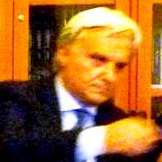A successful Barbiere is by no means a matter of course; neither one of the most brilliant scores ever written nor the intriguing plot are alone enough to ensure an accomplished performance. It needs outstanding voices, a perfect staging, energy and passion. This was the case with Filippo Crivelli's 1998 production at the Teatro di San Carlo, reprised here by Luca Baracchini, as it retains bel canto singing and a joyful atmosphere, along with the refined sets designed by Emanuele Luzzati, mainly characterised by the blue tiles of the walls and the sliding panels. The early 19th-century Spanish décor was emphasised by the costumes of Santuzza Calì.
The cast was headed by baritone Davide Luciano, who portrayed the talkative, witty barber, surprising us when he accompanied Almaviva's serenade on the guitar for real. Jovial and full of vitality, he accentuated the devious dimensions of this clever jack-of-all-trades. We were presented with his agile voice in the dazzling “Largo al factotum”, sung with a rich timbre and good emission.
Xabier Anduaga was a Count Almaviva with great vocal power and stage presence. He sang his two serenades “Ecco ridente in cielo” and “Se il mio nome” with ease. Also, differently from many tenors in this role, he sang the closing aria di bravura “Cessa di più resistere” excellently, with an impeccable Rossinian style and a bright and ductile voice.
As Rosina, Jessica Pratt lived up to the high expectations placed on her performance. Her great technique and clear timbre led to some virtuosic highlights greatly appreciated by the audience. She has a clear and silvery coloratura soprano, and the range of her lively, charming, fluid voice enabled her to perform brilliantly the role of the self-confident, strong-willed woman. The music lesson was a moment of pure grace, as Pratt eliminated “Contro un cor” in favor of “Deh! torna mio bene”, Heinrich Proch’s variations, favoured by the likes of Luisa Tetrazzini, and most frequently introduced in this scene since the end of the 19th century. Pratt sang with lightness and vocal ease Rosina's vivacious melodic lines and pyrotechnic coloratura, trills and arabesques, stunning the audience with the daring naturalness with which she faced this impossible score. Her guardian, Bartolo, was portrayed with energy and dexterity by bass Carlo Lepore, whose performance was impressive for his intelligent use of all the possibilities of his vocal range to embody a presumptuous, ridiculous old man.
Riccardo Fassi gave his Don Basilio a dark timbre, incisive accents, correct comic tempi and stage presence. In “La calunnia”, emblematic of the Rossinian crescendo, he was good at allying his deep bass to the orchestra in the same ascending tension. A mention goes to the talented mezzo Daniela Cappiello who played Berta, Bartolo's funny maid.
In the pit, Riccardo Frizza's incisive contours of rhythm, accents and dynamics provided in the overture a foretaste of the playfulness and precision to follow, marking Rossini's true charm and keeping the score's tension alive. The conductor took hold of the music with energy and delicacy, only lacking some breath from a general point of view, even if the contours were finely chiseled. No less than excellent, as usual, was the chorus prepared by José Luis Basso.




